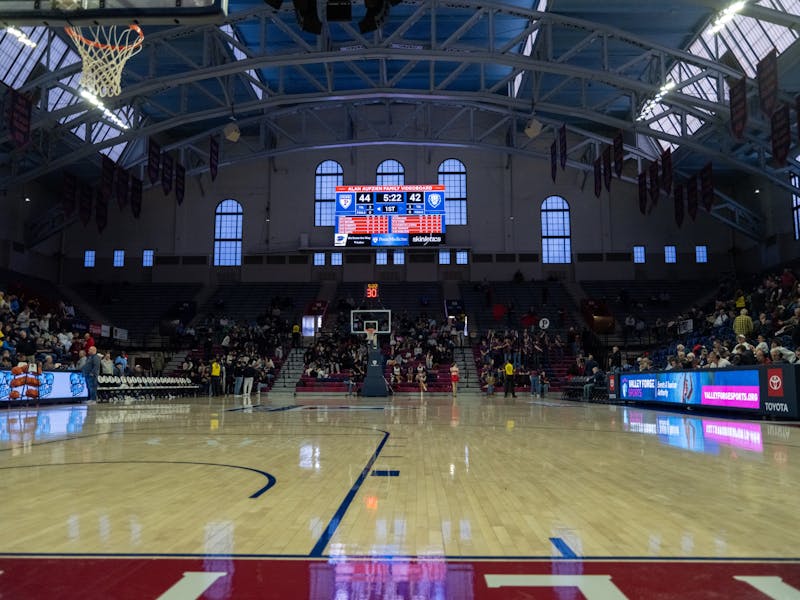In 1954, eight schools came together to sign the Ivy Group Agreement. The agreement established an athletic conference, but a unique conference whose member schools' primary focus would not be on sports, but on academics.
Ivy League athletes are among the best in the nation in numerous sports, but when most people think about walls draped in ivy, images of students buried in books far outnumber those of students burying three pointers. The Ancient Eight is known for producing world leaders, not world record holders.
But, as noted by a story in The Philadelphia Inquirer last week, one of these prestigious insitutions builds its reputation as much on the playing fields as it does in the classroom.
"Athletics defines Princeton as much as its world-class research programs," the Inquirer reported.
This year, the Tigers set an Ivy record by winning 14 conference titles. In terms of athletic success, Princeton is playing on a level far above that of the seven other Ivies.
Fans may like to think Penn is on equal footing with the Tigers in terms of being a jock school, but those supporters are likely blinded by the success of the men's basketball program. While Princeton will hang 14 championship banners this season, the Quakers brought home just four --wrestling, gymnastics, women's squash and men's basketball. It's not even close, folks.
You may look at the numbers and think Princeton is bursting with pride. For many Princetonians, that's certainly true, but for others, their sports teams are cause for concern. I guess these Tigers just have too much of a good thing.
Not too many championships, of course, but too many athletes.
Nearly 800 recruited athletes call Old Nassau home, and for a campus of just 4,600 students, that means 17 percent of students play a sport. But for the second smallest Ivy League school, behind just Dartmouth, those numbers are about to change.
Last month, Princeton's trustees announced that the university plans to increase undergraduate enrollment by 500 students over the course of several years. It's the largest increase in Princeton's population since it first admitted women 30 years ago.
The good news is that it will add more diversity to Princeton's campus. More minority and international students will be granted admission, and the school will welcome a greater number of writers, artists, musicians and scholars.
But for some Princetonians, the good news is also that there will be a smaller percentage of athletes roaming the campus. "I do tend to notice more athletes than poets," student Matthew Chen told the Inquirer. "That's Princeton's reputation, though."
Not so fast.
Yes, that is part of Princeton's reputation, but just a small part of it.
Almost all of Princeton's prestige comes not from the atletc fields, but from being one of the world's premier research institutions. The beautiful thing about Princeton's reputation, and about the entire Ivy League, is that a athlete can also be a poet.
You need to look no further than Princeton's most famous athletic alum to see this.
In the 1960s, Bill Bradley led Princeton to its only Final Four appearance. He went on to a Hall of Fame career with the New York Knicks and is still regarded as the greatest player in Ivy history. But many also know him as one of the most prominent politicians of recent times.
Bradley may be the most obvious example, but other outstanding athletes -- from Princeton and from each of the other Ivy schools alike -- exemplify the ideals administrators had in mind when they signed the 1954 agreement. Athletes excel not just on the playing field, but in numerous academic and professional fields as well.
Princeton students should not be concerned about their athletic image. When people call Princeton a "jock school," they don't mean it the same way they do when they call Florida State or Cincinnati a jock school. Ivy League rules, which include academic indices and a ban on scholarship, may seem archaic at times, but they ensure that the instutions' high academic standards are not tainted.
Princeton students have a legitimate concern in that athletes may be admitted over other deserving students.
The plan to increase enrollment, though, will cure this ill, as the percentage of student-athletes will begin to decline. Applicants who may have been denied admission in the past will start finding acceptance letters intheir mailboxes.
Princeton's "jock problem" will be solved with the new enrollment plan. The university will, however, remain the standard of athletic excellence in the Ivy League.
"Princeton is not Harvard or Yale," writes The Daily Princetonian's Ryan Salvatore. "We are an athletic campus, and there is nothing wrong with that."
No, there is not. So the Tigers should leave the worrying to seven other schools, who need to find a way to crack into those 14championships.
The Daily Pennsylvanian is an independent, student-run newspaper. Please consider making a donation to support the coverage that shapes the University. Your generosity ensures a future of strong journalism at Penn.
DonatePlease note All comments are eligible for publication in The Daily Pennsylvanian.








